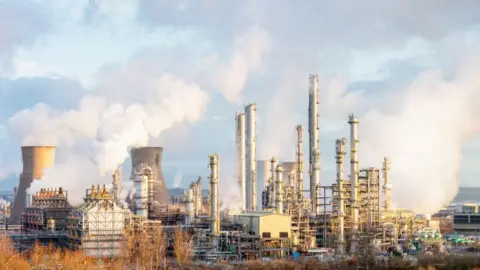SCOTLAND
David Wallace Lockhart
BBC Scotland News Political Correspondent

The closure of the Grangemouth refinery has been described as a "kick in the teeth" by workers
The Labour MP representing Grangemouth has called on the UK government to nationalise the site's oil refinery to maintain operations and save jobs.
Brian Leishman said it was a matter of public interest and national security.
Petroineos - a joint venture between Chinese state-owned PetroChina and London-based Ineos - confirmed last week that the 100-year-old refinery would close with the loss of about 400 jobs.
Prime Minister Sir Keir Starmer said the UK government was working to ensure there are "safe, secure, skilled jobs" in Scotland for “generations to come”.
Petroineos intends to convert the refinery - the oldest in the UK - into a terminal able to import petrol, diesel, aviation fuel and kerosene, which it expects to open early next summer.
A spokesperson said previously that the move would "safeguard fuel supply for Scotland".

Alloa and Grangemouth MP Brian Leishman says the "fight must go on"
Leishman insisted that closure was “not a done deal” and that “the fight must go on”.
He told BBC Scotland News: “We’ve got to pull out all the stops and that includes nationalisation.”
The new MP said that it was “most definitely” time for the government to take over ownership.
Asked if Sir Keir Starmer was doing enough to save the future of Grangemouth, Leishman replied: “I would challenge that.”
He said both the UK and Scottish governments had “held the hand” of the refinery’s owner Petroineos, and had “meekly accepted the narrative that the refinery is unprofitable, which I would absolutely contest".
The Labour parliamentarian said that ensuring a key piece of the refinery’s equipment - the hydrocracker - was working would be “a game changer” for profitability.
He said that energy security was “intrinsically linked” to the UK’s national security, and therefore the government should step in to save operations.

Sir Keir Starmer says the UK government is committed to protecting skilled jobs in Scotland
First Minister John Swinney said he was "deeply disappointed" about the closure, while the Scottish and UK governments announced a joint £100m investment package to support a “just transition for the workforce and community”.
Sir Keir said he knew how “keenly” the closure would be felt in Scotland.
“We also need to make sure the transition to clean energy is real and delivers the secure jobs of the future,” he told BBC Scotland News.
He cited Labour’s commitment to setting up GB energy – a UK government-backed energy company to be headquartered in Scotland.
The location is yet to be announced but BBC Scotland News understands the firm, which will help fund new and existing clean technology, will be based in Aberdeen.
Scotland Secretary Ian Murray has insisted the UK government is "committed to working together looking at how we can help the area build on its skilled workforce and local expertise to boost economic growth".
'Kick in the teeth'
Workers described the announcement as a "kick in the teeth", while unions labelled it a "terrible indictment" of both governments and of the company.
About 2,000 people are directly employed at Grangemouth, including about 500 at the refinery, while others work at Ineos’s petrochemicals business and the Forties pipeline.
Announcing the refinery’s closure, Petroineos said it was unable to compete with sites in Asia, Africa and the Middle East.
The converted terminal is expected require fewer than 100 employees.
The BBC understands the refinery is currently losing about $500,000 (£383,000) a day and is on course to lose around $200m (£153m) in 2024.
The Grangemouth refinery is one of six in the UK and the only one in Scotland.
It was originally opened by BP in 1924 and expanded into petrochemicals in the 1950s. Ineos acquired the site in 2005.
It is the main supplier of aviation fuel for Scotland's airports and a major supplier of petrol and diesel ground fuels across the central belt.
According to Ineos, about half of the refinery’s crude oil comes from the North Sea, with most of it delivered via ship to Finnart Ocean Terminal on Loch Long and piped east across the country to Grangemouth.
Between 250 to 280 of the refinery redundancies are expected to happen in the three months after the plant closes, with 100 staff retained for between six to 12 months to help decommission and to build up the import business.
A further 30 workers are to be retained for longer to work on decommissioning and demolition, which is expected to continue until 2030.
Twenty jobs will also go at the Finnart pipeline terminal at Loch Long.
No comments:
Post a Comment